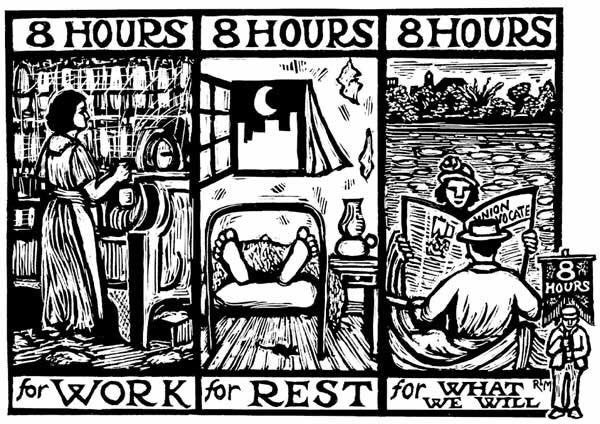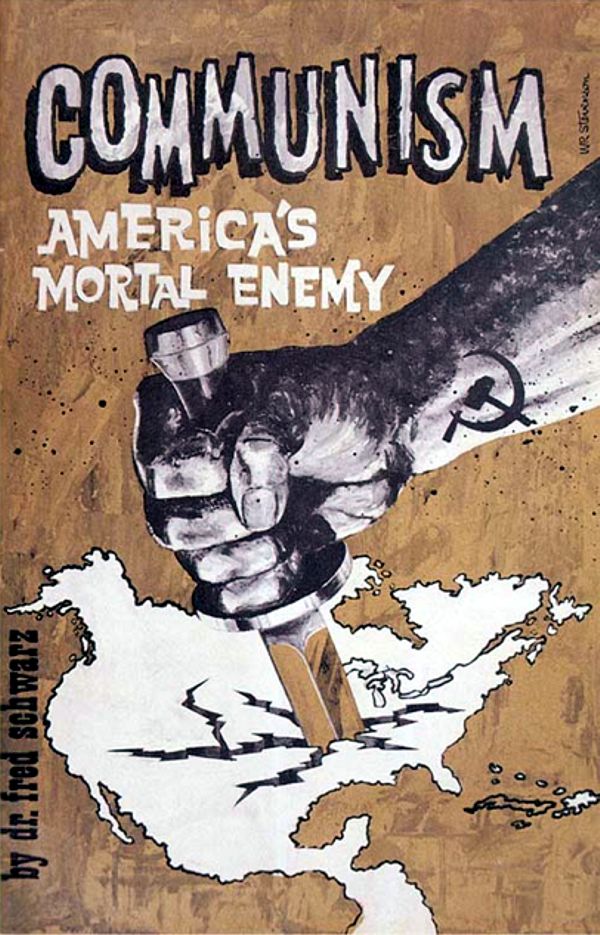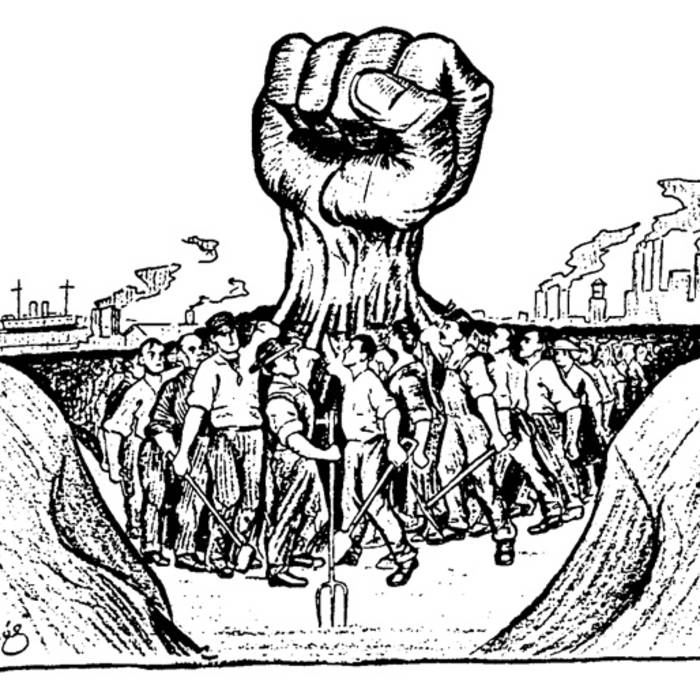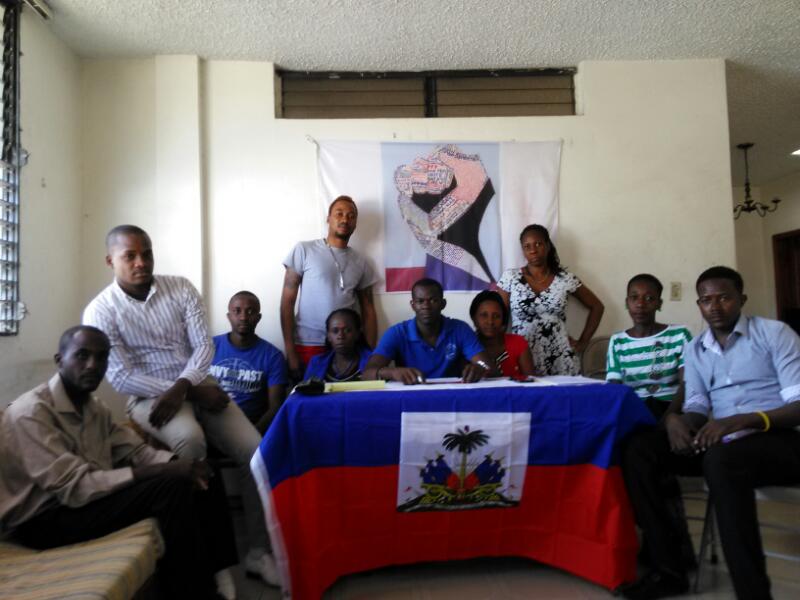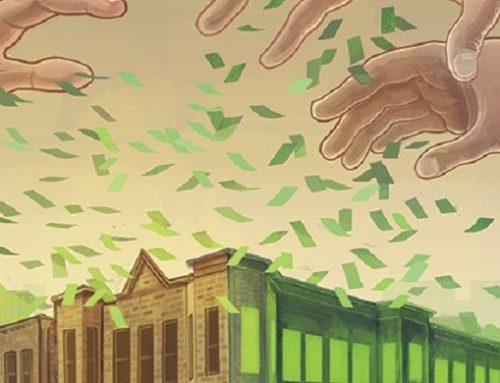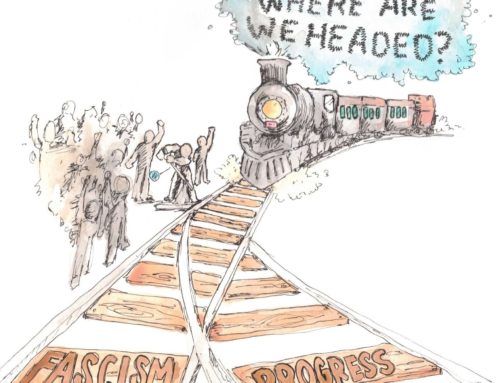May 1st is International Workers Day, aka May Day – a day rooted in Chicago workers’ battle for the eight hour work day. But in the US… we’ve lost our own history.
In the late 19th century, at the height of industrial production in the US, 12 – 16 hour work days, child labor, accidents, and deaths in the workplace were the norm. In the face of capitalists’ blatant disregard for workers’ lives, political consciousness and organized resistance to capitalism were increasing. Organized labor was strong and had ties to socialist and anarchist political currents.
On May 1, 1886, workers in Chicago and across the US went on strike as part of a series of actions to demand the eight hour work day, which became known as the Haymarket Affair. On May 3rd, a protest at the McCormick Reaper plant in Chicago turned violent when police attacked and killed picketing workers. The following day, as a meeting called by organizers in Haymarket Square was wrapping up, police attacked. During the assault, someone threw a bomb, killing both police and workers. Labor and political organizers were rounded up, given a rigged trial, and sentenced to hanging or life in prison for the bombing.
In honor of them, and to keep the fight for the eight-hour workday present, the Second International, a conference of socialists, declared May 1st as International Workers Day in 1889.
May Day vs. Labor Day?
So, why does the rest of the world commemorate International Workers Day on May 1st? In the US we have Labor Day in September, and most don’t know May Day’s history. We are disconnected from people’s history and class struggle is constantly being obscured.
In the 1950’s, during the fervor of US anti-communism and the Cold War, President Eisenhower attempted to erase the origins of May 1. Those roots were based on workers’ solidarity nationally and internationally. He signed a resolution naming May 1st as “Loyalty Day,” a “special day for the reaffirmation of loyalty to the United States of America and for the recognition of the heritage of American freedom.”
Nobody celebrates “Loyalty Day,” but we all usually get an invite to a Labor Day barbeque the first Monday of each September, right? In 1887, recognizing the need to quell workers’ discontent, many cities and states, including New York, adopted Labor Day in September as an official holiday and day off from work. This had the bonus effect of filling parks, shops, and bars with customers ($$$). Labor Day became a federal holiday in 1894 when President Grover Cleveland decided he needed to throw workers a bone and say, “hey, you do kind of matter,” in the wake of the massive disruption to the national railroad system caused by the Pullman strikes.
But even this combative element of US Labor Day has been reduced to BBQ’s, booze, American flags, and clearance sales. We’re trained to ignore the violent exploitation that built this country. History was re-written for capitalist interests focused on nationalism rather than international solidarity… Because, divided we are weak.
Organization, Not BBQs
Hamburgers, beer, and a day off work won’t address our reality. The very basic rights of the eight-hour day are pretty much gone. How many of us work multiple jobs (in retail, the service industry, the gig economy) just to keep up? Wages remain stagnant while costs of living increase. The labor movement in the US has been fully absorbed by capitalist interests and the Democratic party, while the left is weak and disorganized. At the same time, we see fascism building around the world.
Since the Haymarket Affair and that moment of strong organization and resistance, capitalists have excelled at side-stepping and pacifying us. Through the project of “globalization” and “offshoring” jobs, aka imperialism, capitalism now dominates the planet, destroying national economies, organized labor, and any form of regulation in dominated countries, allowing for extreme exploitation and the expansion of markets and profits. This also allowed for the production of cheap goods and the expansion of a “middle class” or petite bourgeoisie in the US and other imperialist countries. More and more people became easily pacified with the ability to purchase their own homes and cars, and maintain ‘upward mobility’ by attending universities.
This ability to “ascend” within capitalism, coupled with serious repressive efforts by the capitalists (red scare McCarthyism, Cointelpro, commodification of academia and the arts, etc) has facilitated the erosion of combative organization and resistance. The everyday class struggle that’s at the core of our reality is obscured. We’ve allowed ourselves to become passive consumers, disconnected from exploitative production (in the US and abroad), simply because it’s removed from our line of sight. Capitalist ideologies of individualism and nationalism reinforce our indifference towards our exploited sisters and brothers, while we monitor fashion trends and peruse aisle after aisle of products that are all the same with slightly different packaging.
International Solidarity
We’ve been led so far from the struggles of workers and laborers to end exploitation and domination. On May Day, we should commemorate the progressive struggles that brought us our basic rights and assess where we’re at and where we need to go. Rather than lose ourselves in guilt or pretend that our consumption choices make any meaningful difference, let’s organize and re-ignite our spirit of international solidarity.
In 2012, One Struggle traveled to Haiti and met with textile workers organizing with the trade union, SOTA-BO, affiliated with the workers movement, Batay Ouvriye (BO). BO is an intermediate level organization born out of a mass movement in Haiti. Since the 1980’s, they have hustled with fierce commitment to organize and grow, constructing textile unions, neighborhood groups, and peasant associations throughout the country as part of an independent and autonomous movement.
Workers earn around $5 a day. They live in debt and on the brink of homelessness. Their organizing efforts are met with fierce repression, and yet they continue to fight for their right to organize, for a decent wage and safe working conditions. Sound familiar?
Garment workers in Haiti produce much of the t-shirts, socks, jeans, and active-wear consumed in the US and Canada. In our discussions, they called for international solidarity, but also said, “You must organize a movement in the US. That is one of the best forms of solidarity you can offer.”
When we returned to Miami we re-initiated the Rapid Response Network (RRN) to build international solidarity and to expose imperialism. Since then, we’ve continued to support and learn from the experiences in Haiti.
Batay Ouvriye has reached a maturity where they realize the fight for wages is limited without advancing the struggle to the broader political fight against capitalist and imperialist domination of the country. You can click here to read their recent leaflet about this. It was distributed throughout the capital city, Port Au Prince.
Here in the US, we have work to do. We can look to history and present examples like Batay Ouvriye, plus learn from our own experiences to construct a way forward. Any of the concessions we’ve gained under capitalism/imperialism have come through organization and struggle. We need to recognize this and get back to organizing… not just reforming capitalism/imperialism. We must weaken it.
Let’s continue the struggle for which Chicago workers and all those before them fought and died. We’ve seen an increase in resistance to capitalism’s effects and failures like the Women’s March and March for Our Lives, but we need to move beyond single issue mobilizations and construct a movement that unites all of us – workers, students, teachers, service laborers – against our common enemy – capitalism.
Let’s build a combative movement and organizations of resistance! This starts with where we’re at – in our schools, neighborhoods, workplaces, families and friendships.
Stand Up. Fight Back. ORGANIZE.
Please get in touch if you agree or would like to discuss this more.
onestruggle.southflorida@gmail.com
onestruggle.fiu@gmail.com
FB – @OneStruggle
IG – @SeedsofUnity
IG – @OneStruggle.FIU
Twitter – @OneStruggleSF

